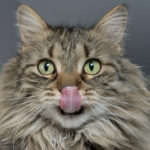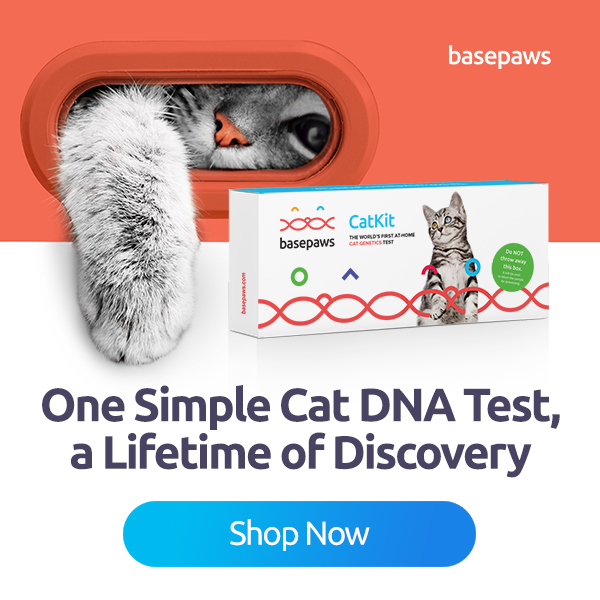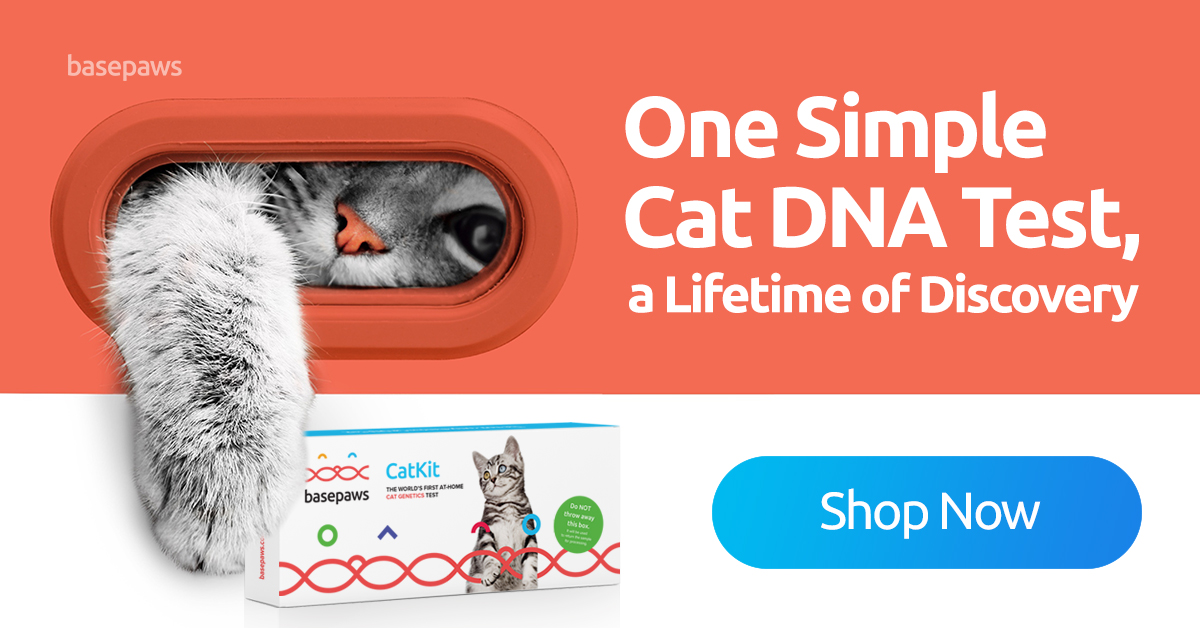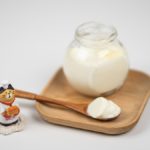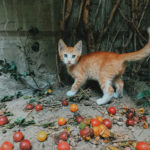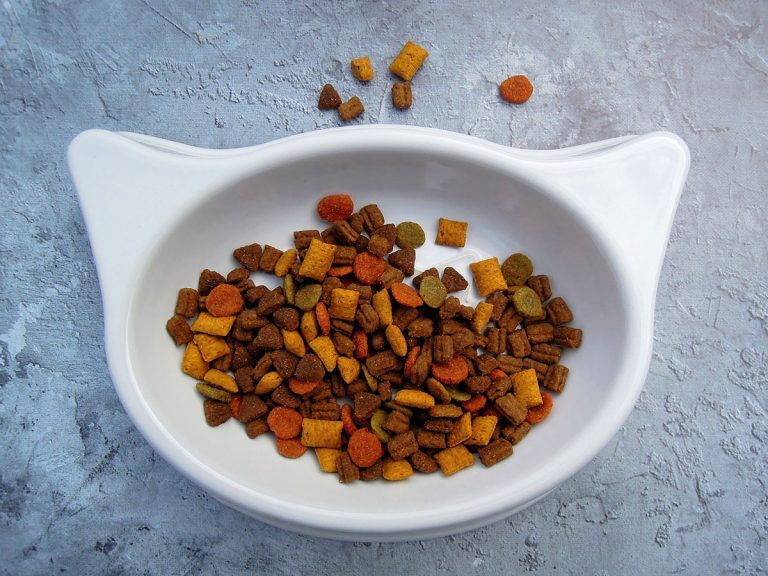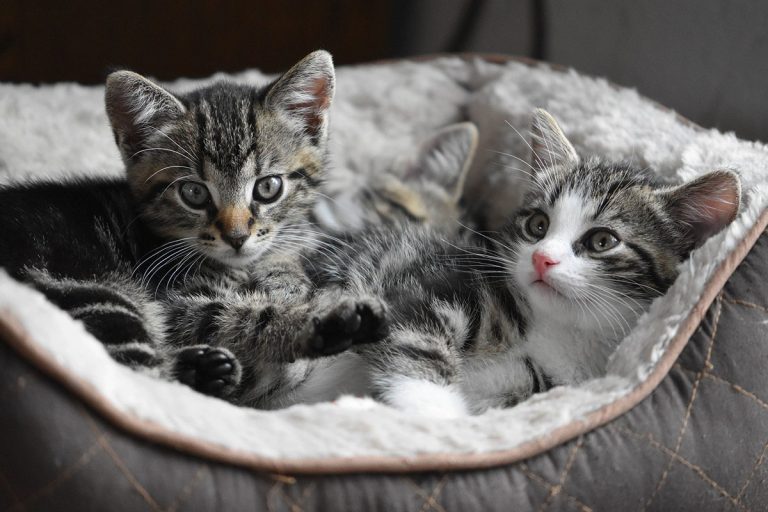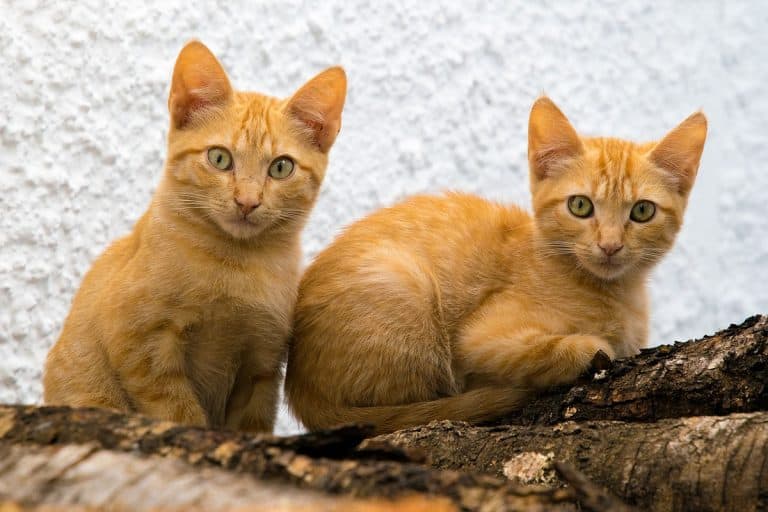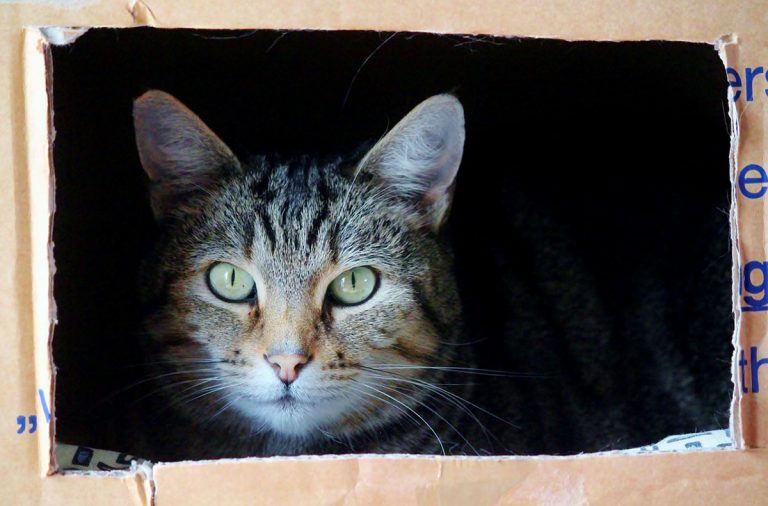Does your cat throw up often or leave smelly poops in the litter box? She might be suffering from a sensitive stomach. Read our guide to find out what you can do to help your cat feel better and what is the best cat food for sensitive stomach cats.
We have reviewed over 20 different options of cat food for digestive issues and selected the top 5 for an in-depth look to see which is the best cat food for digestion.
DISCLAIMER: This post may contain affiliate links. If you click one of these links and decide to make a purchase, we may receive a small commission. This comes at no extra cost to you and helps to keep the site alive and up to date. If you want more information, please review our Privacy Policy. Thank you for your support!
A Quick Look At Our Favorites
| Product | Rating | Why We Like It | |||||||||
|---|---|---|---|---|---|---|---|---|---|---|---|
| 1 |  | Instinct Limited Ingredient Diet | Hypoallergenic | Buy on Amazon | |||||||
| 2 |  | Farmina Natural & Delicious | Easy Digestion | Buy on Amazon | |||||||
| 3 |  | Diamond Naturals High Protein Active Cat | High Protein | Buy on Amazon | |||||||
| 4 |  | Blue Buffalo Basics Limited Ingredient Diet | Against Vomiting | Buy on Amazon | |||||||
| 5 |  | Natural Balance Limited Ingredient Diets | No By-Products | Buy on Amazon | |||||||
| Moisture | Protein* (min.) | Fat* (min.) | Fiber* (max.) | Carbs* (approx.) | Ash* (approx.) | Calories (approx.) | Allergens | ||||
| 1 |  | 76% | 48% | 29% | 8% | 15% | 0% | 112 / 100g | none | ||
| 2 |  | 78% | 59% | 20% | 5% | 2% | 14% | 86 / 100g | eggs, seafood | ||
| 3 |  | 10% | 44% | 22% | 3% | 30% | 0% | 405 / 100g | seafood | ||
| 4 |  | 9% | 33% | 15% | 7% | 45% | 0% | 368 / 100g | seafood | ||
| 5 |  | 10% | 33% | 13% | 6% | 48% | 0% | 358 / 100g | seafood | ||
| * on a dry matter basis | |||||||||||
| What We Like | What We Don't Like | ||||||||||
| 1 |  |
|
| ||||||||
| 2 |  |
|
| ||||||||
| 3 |  |
|
| ||||||||
| 4 |  |
|
| ||||||||
| 5 |  |
|
| ||||||||
| 1 |  | Instinct Limited Ingredient Diet Hypoallergenic | Buy on Amazon | ||
| 2 |  | Farmina Natural & Delicious Easy Digestion | Buy on Amazon | ||
| 3 |  | Diamond Naturals High Protein Active Cat High Protein | Buy on Amazon | ||
| 4 |  | Blue Buffalo Basics Limited Ingredient Diet Against Vomiting | Buy on Amazon | ||
| 5 |  | Natural Balance Limited Ingredient Diets No By-Products | Buy on Amazon | ||
Best Cat Food For Sensitive Stomach Cats
The products that we have selected as the best choices for sensitive stomach are all dairy- and grain-free, since these are the ingredients that are most often at the root of a cat’s stomach problems. If there are any other allergens present, we list them in the reviews.
Please check out our Cat Food Database for more cat food for digestive problems and a full nutritional analysis of 1000+ popular cat foods.
A WORD OF CAUTION: Always be careful when introducing your cat to a new food. The change in nutritional composition can cause digestive upset or allergic reactions, so it is best to take it slowly. Give her only a bit of the food at first, combined with her old food, and monitor how well your cat does on it. If you see any signs of an allergic reaction (difficulty breathing, rashes, elevated heart rate, diarrhea, vomiting) switch back to her old food and contact your vet immediately.
Best Cat Food For Digestion And Allergies: Instinct Limited Ingredient Diet Wet Cat Food
Instinct Limited Ingredient Diet is a dietary wet food especially formulated for cats with allergies and digestive problems. It gets its animal proteins exclusively from turkey. The limited list of ingredients means it is much easier to digest and puts less strain on your cat’s stomach. It also greatly decreases the chance of your cat ingesting an upsetting allergen, since there are no hidden ingredients.
However, every commercial cat food on the market today seems to contain at least one ingredient that some cats are allergic to. In the case of Instinct Limited Ingredient Diet, and most other foods on this list, this ingredient is peas. On the plus side, there are no grains, fish, dairy or eggs in this product. So if your cat can tolerate the peas, this is actually a great choice for sensitive stomachs.
I do want to caution you about issues some customers have reported with getting this cat food for digestive issues delivered. If you live far away from the location it is distributed from and the delivery truck is not refrigerated, there is a chance the natural ingredients may spoil before getting to you. Don’t feed it to your cat if it looks dried out or darker than usual. Nonetheless, thanks to our modern infrastructures and 24 hour delivery, most cat owners don’t experience any problems.
| What We Like |
|---|
|
| What We Don't Like |
|---|
|
Related Post: Is Pet Insurance Worth It For Indoor Cats?
Is pet insurance worth it for indoor cats? Read this guide to learn about pet insurance for cats and calculate if it is really worth it for your indoor cat.Best High Fiber Cat Food For Digestive Issues: Farmina Natural & Delicious Venison And Pumpkin Wet Cat Food
Farmina Natural & Delicious Venison And Pumpkin Wet Cat Food is an all natural cat food with venison as its main ingredient, which is a quality source of protein. It’s also very lean, which is great for a cat with stomach problems. This cat food contains zero filler ingredients like grains or soy and no by-products whatsoever.
Farmina Natural & Delicious Venison And Pumpkin is actually one of the highest quality cat foods in our Cat Food Database.
The addition of pumpkin is what makes Farmina Natural & Delicious Venison And Pumpkin an excellent choice for digestively challenged cats. Pumpkin is a great source of dietary fiber and natural probiotics. It adds just enough carbs for your cat’s bowels to function properly, while not putting her at risk for diabetes.
This high protein wet food also has a high amount of ash. Ash refers to the inorganic minerals that are left behind when all the organic material is cooked or burned off. It may sound odd, but it’s actually really healthy for your cat! It includes calcium and potassium, which are essential for their digestive system. That said, it is the only cat food for digestive problems on our list that does not contain any vitamin B12 supplement, which would provide some extra support to your cat’s colon.
Unfortunately Farmina Natural & Delicious Venison And Pumpkin Wet Cat Food is not a good choice for cats with food intolerances, because it contains fish and eggs (but no peas!). Though they are not raw, if your cat is allergic to either of these, you obviously should not feed it to her.
| What We Like |
|---|
|
| What We Don't Like |
|---|
|
Related Post: Is Peanut Butter Good For Cats?
Peanut butter is great to give medicine to dogs and hide its taste. But is peanut butter good for cats? Or should they stay away from it? Read on to find out.Best High Protein Dry Cat Food For Digestive Problems: Diamond Naturals High Protein Active Cat Dry Cat Food
Diamond Naturals Active Cat is a dry cat food that is not only high in protein content, but also relatively low on carbs compared to other dry foods. It contains probiotics from pumpkin and is easy to digest. It is the only dry cat food for digestive issues on our list that does not contain peas, which makes it a great choice for cats who are allergic to this vegetable protein.
This product is higher in calories than the average dry food to cater to more active cats. This can actually be a good thing for your sensitive cat too, if she is on a strict feeding schedule. She will need to eat less to feel full, which will put less strain on her digestive system. However, if you’re free feeding this may not be the best choice. Your kitty could easily overeat and become obese or diabetic.
The most obvious downside to Diamond Naturals Active Cat is the inclusion of various fruits and vegetables. These are marketed as “superfoods”. Which they mostly are, for humans. But it’s always important to remember that cats are not humans and their nutritional needs differ a lot from ours. Not all cats respond badly to these ingredients, though, so you’ll have to test it out with your cat. And always supplement their diet with a quality wet food. Feeding only a dry food diet can be severely detrimental to your cat’s health in the long run.
| What We Like |
|---|
|
| What We Don't Like |
|---|
|
Best Limited Ingredient Dry Cat Food For Digestive Issues: Blue Buffalo Basics Limited Ingredient Diet Dry Cat Food
Blue Buffalo Basics Limited Ingredient Diet is a dry kibble with meat as its main ingredient. The protein content is further increased by the addition of, you guessed it, peas. Previous warnings do apply.
Blue Buffalo Basics Limited Ingredient Diet comes in 3 flavors, though one of them is fish. I recommend sticking to the turkey or duck flavors for cats with digestive problems. These do also contain fish oil, but only as a supplement of omega-3 fatty acids. Not suitable for cats with seafood allergies, but not much of a threat for the average cat.
Guardians of sensitive stomach cats generally report good outcomes when transferring their cats to this diet. It helps to stop regular diarrhea and vomiting in cats. It seems to work especially well for cats who are allergic to chicken.
Unfortunately, there are some filler ingredients in this product, besides the peas. Namely potatoes and tapioca starch. Tapioca is made from cassava root, which is poisonous to cats when ingested in large enough doses. Again, feeding a combination of wet and dry foods should be enough to balance out your cat’s diet.
| What We Like |
|---|
|
| What We Don't Like |
|---|
|
Honorable Mention: Natural Balance Limited Ingredient Diets Dry Cat Food
Natural Balance Limited Ingredient Diets dry cat food is also specifically formulated for sensitive stomachs. Just like Instinct Limited Ingredient Diet and Blue Buffalo Basics Limited Ingredient Diet, this product contains green peas, so watch out if your cat is allergic. The main difference between this one and the other two is that Natural Balance lists peas as its main ingredient and main source of protein. This obviously makes it the less favorable choice.
On the upside, Natural Balance Limited Ingredient Diets contains a lot of minerals and only a single source of animal protein, which promotes digestibility. It is also completely free of by-products, grains and additives.
Nevertheless, we were a bit reluctant to include this product on our list. It appears that this once wholesome cat food company has been taken over by The J.M. Smucker Company, a large corporation specialised in sugary jams and peanut butters. Unfortunately, as corporations do, good ingredients were replaced with cheaper ingredients. Some cat owners are reporting that their sensitive stomach cats don’t respond well to this new formula. That is why it did not make it into our top 5 of the best cat food for digestive problems.
If you do choose to buy this product, start with a small package and monitor your cat’s well-being as you transfer her to the new food. Complement it with one of the recommended wet foods on this list to make sure your kitty gets all her nutrients.
| What We Like |
|---|
|
| What We Don't Like |
|---|
|
Best Cat Food For Digestive Problems: Instinct Limited Ingredient Diet Wet Cat Food
Since it is the only product on our list with no filler ingredients, grain, dairy, fish or eggs, we have to declare Instinct Limited Ingredient Diet the best cat food for sensitive stomach cats. It is highly digestible, healthy and a great choice for cats who suffer from food intolerances or allergies.
That said, the peas can be a concern. If you know or suspect that your cat is allergic to this ingredient (but definitely not allergic to fish or eggs), we recommend you choose Farmina Natural & Delicious Venison And Pumpkin instead. The extra fiber from the pumpkin makes this an excellent cat food for digestive problems.
How To Tell If Your Cat Has A Sensitive Stomach
Are you not sure if your cat has a sensitive stomach? These are the signs to look out for.
Lack Of Appetite
The biggest warning sign is if your cat starts to refuse her food. Cats need to eat, obviously, and really can’t go without for too long. A cat that doesn’t eat will pass away within 2 to 3 days. So if you notice a lack of appetite in your cat, rush her to the vet for a thorough check-up!
Vomiting Or Regurgitation
Regurgitation and vomiting in cats is not uncommon. You can expect it to happen every now and again. But if your cat is throwing up once a day for three or more consecutive days, or multiple times a day for two or more days, she runs the risk of getting dehydrated and underfed. If you see this happening, it is time to take her to the vet.
Diarrhea Or Constipation
A normal cat on a healthy diet poops about once every 24 to 36 hours. If you notice a sudden change in your cat’s habits, it could be a sign of trouble. She could be going to the litter box more due to diarrhea, or less due to constipation. Her feces might be a different color or consistency than normal. Call your vet for advice and monitor your cat closely.
Increased Thirst
If your cat starts to drink and pee significantly more than usual, it could be that she has trouble passing her food. In general, increased thirst in cats is a cause for worry, as it could be a sign of kidney failure. Keep an eye on her and if it continues, or you see any other signs, call your vet.
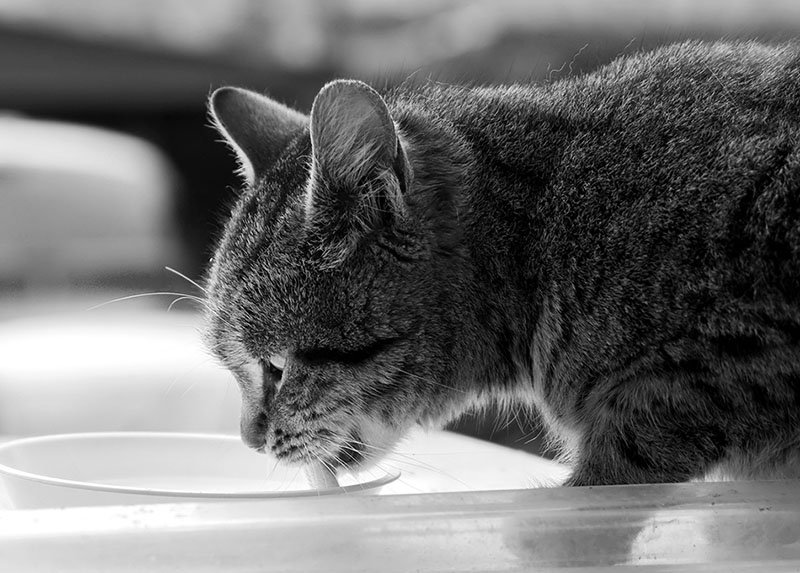
Poor Looking Coat Or Skin Problems
Digestive problems in cats can also manifest as problems with their skin or coat. For instance, pancreatitis leads to a decreased ability to process fats, which results in a greasy looking coat. Food allergies are known to cause severe itching and dandruff.
What Can Cause A Sensitive Stomach In Cats?
It can be difficult to determine exactly what has caused your cat’s stomach to get upset. In all cases, it is best to consult with your vet to see what, if anything, can be immediately ruled out. Keep track of what your cat is eating, and how much. This information will help to figure out what is wrong with your feline.
Changes In Diet
If your cat is showing signs of a sensitive stomach after a change in diet, it could be the new food that is causing it. The change in nutritional composition can take her some getting used to and result in a few bouts of diarrhea.
Simply switch her back to the old food until her stomach settles and try again. This time, take it slowly. Mix in a bit of the new food with her old food. Increase the ratio of new to old over the course of about a week and see if your kitty’s stomach tolerates it.
If you find yourself scooping liquid poops again, then this food is clearly not for your cat. Stick with your old brand, or find one that better suits your cat’s needs.
Unbalanced Or Unhealthy Diet
Even if your kitty takes to the food at first, problems might develop over time. A cat food that is nutritionally unbalanced or outright unhealthy can be a yummy snack, but it will do its damage if your cat eats it every day. She won’t get the vitamins and supplements she needs to keep her body healthy and digestive system working properly. Unhealthy ingredients are usually harder to digest, so your cat’s stomach could end up not tolerating it anymore.
Worst case scenario, your cat can actually develop serious illnesses from eating an unhealthy diet. Diabetes, heart problems and pancreatitis are debilitating and incurable diseases that will definitely shorten a kitty’s life.
Always look for the phrase “Complete & Balanced” on cat food packaging. This label guarantees that it contains all the nutrients that your cat needs to stay healthy.
Parasites
Parasites, such as worms, are not uncommon in cats. The meat that they eat, bugs and other things from outside can all contribute to infecting them. If left untreated, parasites can cause disturbances in your cat’s digestive tract and give her diarrhea, or even make her vomit.
As cat owners we need to be vigilant about preventing and curing parasites in all our kitties. Regularly administer a dewormer to your cat, so you can be sure to keep her parasite-free.
Hairballs
Another common cause of digestive problems are hairballs. Every cat guardian has to deal with finding a slimy ball of coughed up fur once in a while. And that’s fine, as long as it doesn’t happen too often.
If you start finding hairballs every few days or more, there could be something seriously wrong with your cat. Maybe she is feeling down and grooming excessively. Maybe something got stuck in her stomach or intestines and she can’t pass anything properly. Maybe both.
Too many hairballs can lead to constipation and obstipation. These are serious and life-threatening conditions. Give your cat some hairball treats, or laxatives in the form of anti-hairball paste. If she doesn’t pass any feces in 48 hours or more, take her to the vet immediately.
Allergies And Food Intolerances
Cats can be born with or develop allergies and food intolerances, just like us. If your cat is sensitive to something, it might not be obvious right away. Symptoms generally tend to increase as your cat is exposed to the allergen over longer periods of time. Eventually, she might develop a rash, usually on the face or along the spine. She also might vomit or have loose stools.
Finding out what she is allergic to will take some investigating. Your vet can help by running tests. Meanwhile, you need to remove any possible source from your cat’s environment and diet, and reintroduce them one by one. All the while tracking and managing her symptoms.
Hopefully it won’t take too long before you identify the culprit. From then on it’s just a matter of making sure that your kitty doesn’t come into contact with the allergen again. Be careful to read those food labels! Hidden ingredients can be a real problem for allergic cats and their owners.
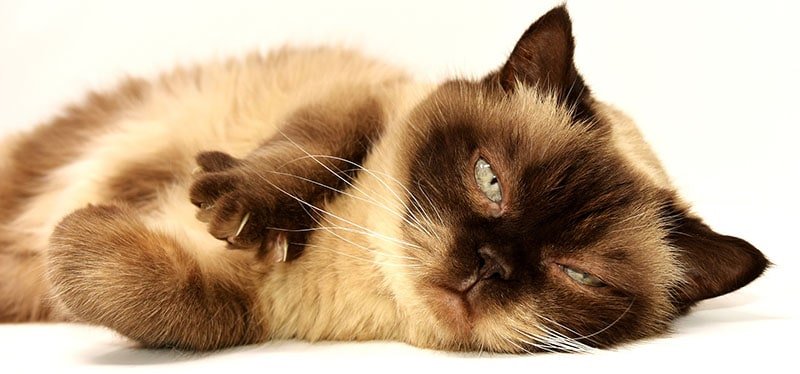
A Proper Diet For Sensitive Stomachs
Quality Animal Protein
The main ingredient of any gastrointestinal food for cats should be a quality animal protein. Poultry (chicken, turkey and duck) is the best choice, though rabbit and venison are great options as well. For cats with sensitive stomachs the protein should preferably come from a single source. This puts less strain on her digestive system and keeps it easier to limit exposure to allergens. Not all proteins are good, though. If your cat has digestive issues I recommend staying away from beef, raw eggs and raw fish and limit proteins from vegetables.
Fats And Fatty Acids
Your cat should always get the bulk of its calories from proteins, but some fats are also essential. Look for a food that contains natural animal fats. These have fatty acids that help to keep your cat’s colon running smoothly and her coat stay soft and shiny.
Probiotics
Probiotics are good bacteria that help your cat’s digestion. Sick and sensitive cats can be given some extra support with a food that contains a good variety of probiotics. Look for the words “Bifidobacterium” and “Enterococcus” on the cat food packaging. If your cat food does not contain probiotics, you also have the option of supplementing them yourself through the use of a probiotic powder or by making your own probiotic yogurt for cats.
Related Post: Homemade Probiotic Yogurt For Cats In 4 Easy Steps
Making your own homemade probiotic yogurt for cats is easy! Just follow these 4 steps to create a healthy, all natural treat for your cat.No Filler Ingredients
Filler ingredients like grain and soy are difficult to digest for the obligate carnivores that cats are. Be most vigilant about this one when it comes to the dry food you select for your cat. Kibbles tend to be overloaded with grains, though there are some grain-free, protein-based variants available nowadays.
Related Post: Can Cats Survive On A Vegan Diet?
Can cats survive on a vegan diet? In short: no. Read this article to learn about the risks associated with vegan diets for cats and why cats can’t be vegan.No By-Products
By-products are not necessarily bad for cats. After all, they eat intestines and what not in the wild. The problem with by-products is that they are not further specified on any cat food label. This makes it impossible to determine if they include something that your cat is allergic to or not. Best to avoid them altogether.
No Dairy
Despite the image we have in our heads of a cute kitty with a saucer of milk, most cats are actually lactose-intolerant. I recommend staying away from dairy for every cat, but especially those with sensitive tummies. Lactose-intolerance in cats leads to diarrhea, passing gas and, in severe cases, vomiting.
If you do want to give your cat milk, consider a kitten milk replacer or goat’s milk instead of regular cow’s milk. Or make your own probiotic yogurt for cats! Yogurt is low in lactose and can be safely eaten by cats, in moderation.


